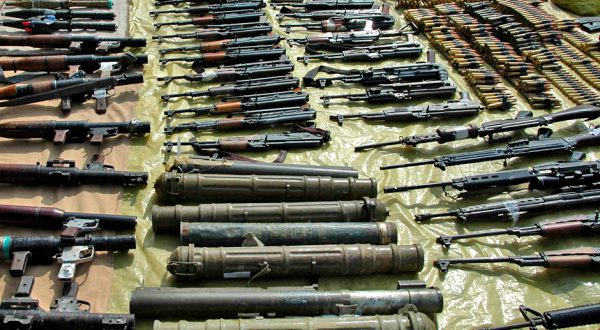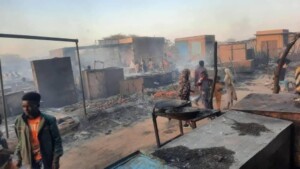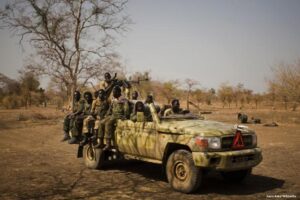Darfur: clashes in El Fasher, looting in Zalingei, panic in El Geneina, detentions in Nyala

(File photo)
The fall of Nyala and Zalingei, capitals of South Darfur and Central Darfur, to the Rapid Support Forces (RSF) within one week has created panic among the people of Darfur. They fear that the entire western region will come under the control of the paramilitary group.
Fighting between the Sudan Armed Forces (SAF) and the RSF continued in El Fasher, capital of North Darfur, yesterday. Residents reported that the warring parties fought each other with light and heavy weapons. Several houses were hit by missiles.
They told Radio Dabanga that “the shelling began sporadically early yesterday morning before resuming violently in the afternoon”. One of them said that he saw a drone fly near the army garrison in the city but he could not confirm whether it dropped a bomb on the base.
Shelling was heard from the El Fasher Grand Market and the eastern side of the city.
The sources expressed their fear that the RSF will take control of the city as happened with Nyala on Thursday last week and Zalingei yesterday.
Sheikh Abdelrazig Yousef, coordinator of the camps for the displaced in Zalingei, told Radio Dabanga that at least 12 people were injured by stray bullets and shells yesterday when RSF took over the army base of the 21st Division in the city.
Seven victims live in the Hasaheisa camp, three in the Hamidiya camp, and two others inside the city of Zalingei.
Yousef further reported “widespread plundering of a large number of houses in the southern part of the Hasaheisa camp by bandits” after the RSF partially lifted the weeks-long siege of the camp. “Many people fled to the Hamidiya camp.”
He described the security situation as extremely tense. “The Zalingei Grand Market is still closed. Those in Merin, Abuja, and Sabreen partially opened again.”
In neighbouring West Darfur, people still living in the capital El Geneina panicked yesterday after rumours about imminent battles for the army’s 15th Division base in the city.
“The markets were closed, and people crowded at the mills to have their grain grounded before all hell breaks loose again,” a listener told Radio Dabanga from already devastated city.
The El Geneina Teaching Hospital and other health facilities are operating again, as electricity and the El Sudani communication network returned, he said, and added that various meetings are taking place between native administration leaders and other parties, in order to prevent new confrontations between the army and the RSF.
Nyala
RSF Intelligence in Nyala detained a large number of soldiers from the 16th Infantry Division after the RSF took control of the city on Thursday last week.
The family of detainee Salah Abakar told Radio Dabanga that their son, member of the artillery command of the division was held from his home in the Teksas neighbourhood on Saturday, October 27, and called for his rapid release.
Other sources reported from Nyala that the city is witnessing a cautious calm after the heavy battles last week, which destroyed parts of the Southern Market and led to the plundering of institutions and houses.
Mandeep O’Brien, UNICEF country director in Sudan, expressed grave concern over attacks on health workers and the looting of the Emergency Paediatric Centre in Nyala, South Darfur.
“With intensified fighting in Nyala, more important than ever for health systems to be sustained for every child,” she said in a post on X (formerly Twitter) on Monday. “The fighting needs to stop. Sudan needs peace now.”
Joint Protection Force
The Darfur Joint Protection Force, consisting of former rebel fighters, announced yesterday that its forces remain positioned in Nyala and will never leave the city.
The protection force, formed on 27 April by four former rebel groups that signed the Juba Peace Agreement with the Sudanese government in October 2020, was deployed in Nyala in end August, when the city witnessed fierce fighting between the SAF and the RSF.
Maj Ahmed Hussein, head of the force’s media committee, said in a press statement yesterday that there is no reason for the joint force to leave Nyala, as “it is a neutral party that rejects war and calls for peace”.
He reacted to a video circulating on social media that shows a large number of vehicles exiting Nyala, accompanied by an audio comment that says that the vehicles belong to the Joint Protection Force.
According to Hussein, the joint force had decided to evacuate civilians to safe places, following the clashes last week.
‘Spreading’
Yassir Arman, spokesperson for the Forces for Freedom and Change-Central Council, said in a post on X yesterday that what happened in Zalingei and especially in Nyala, the second commercial city after Khartoum, will certainly spread to other areas.
He warned that the RSF control over these cities will have profound political, economic, and military effects on the war and politics.
The Sudan War Monitor commented yesterday that “RSF’s capture of Nyala could bring some humanitarian relief as the majority of residents will be able to move more freely without fear of shelling, cross-fire, and aerial bombardments. [..]
“In Zalingei, there is a substantial risk of continuing clashes between RSF and SAF remnants, as well as SLA [rebel] factions and other armed groups in and around the displaced camps and in the countryside,” the analysis reads.
“The RSF have been blocking supplies to the Hasaheisa camp for several weeks. The residents of the camp are majority ethnic Fur, and the RSF are majority Arab, giving this conflict an ethnic character.
“In the medium to longer term, RSF’s victories do not mean the region will necessarily stabilize. The paramilitary’s control over Darfur is fractious and incomplete. Large areas are occupied by former Darfur rebel factions (which are hitherto neutral), as well as tribal militias. Relations between RSF and the former rebels remain generally stable, though increasingly tense, after RSF fighters killed some members in Nyala.”
Last month, the Darfur Bar Association warned that the RSF would “settle combat operations in South Darfur, with the city of Nyala as its centre,” leading to more tribal disputes and clashes in the region.











 and then
and then